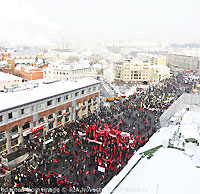NEWSLINK: After a year of protest, a different Russia beckons

[After a year of protest, a different Russia beckons – Washington Post – Will Englund and Kathy Lally – Dec. 5, 2012 – Click here for full article]
The Washington Post covers the one-year anniversary of the large protests that broke out in Russia in December 2010:
The political protests that suddenly began a year ago seemingly accomplished little concrete change in Russia: The Kremlin is still fully in control of the parliament, police and courts and not at all bashful about deploying them against its foes.
Yet the past 12 months have shown for the first time here how people can organize themselves to take action and demonstrate broad dissatisfaction with the government of President Vladimir Putin.
The protests have pushed the president into a reactive posture and given the protesters an unfamiliar sense of solidarity …
* * *
The protests erupted Dec. 5, 2011, as a call for clean elections and over several months turned into anti-Putin events. With no agenda, no specific demands, they have run their course for now (although another is planned for Dec. 15). But they served as huge meeting grounds, and from them, many smaller, local, specific actions have come about.
There has been a backlash from those in power:
Since his return to the presidency in March, Putin has relentlessly demonstrated his determination to quell dissent.
In an apparent attempt to scare off demonstrators, 17 protesters are being prosecuted for their part in a May 6 rally on the eve of Putin’s inauguration, accused of attacking police officers. One has already been sentenced to 41 / 2 years in prison.
A newly passed law defines treason so broadly that some Russians are afraid that even associating with foreigners could put them at peril. The penalties for slander and violations of rules governing rallies have been toughened. As of Nov. 21, nongovernmental organizations that receive money from abroad must register as foreign agents. The Moscow Helsinki Group and others say they will defy the law.
One by one, opposition leaders have come under intense pressure. Alexei Navalny, the anti-corruption blogger, has been charged with bribery in a recently resurrected three-year-old case. Sergei Udaltsov, a socialist leader, has been charged with plotting mass disorder.
One of his associates, Leonid Razvozzhayev, accused Russian authorities of abducting him in Ukraine, where he was seeking asylum. On Nov. 22, Russian investigators said they would not investigate the case because Razvozzhayev had not presented convincing evidence that he had been spirited out of Ukraine.
In September, Gennady Gudkov, like Putin a former KGB agent, was stripped of his parliamentary seat after he aligned himself with protesters. Alexander Lebedev, a former KGB agent who along with Mikhail Gorbachev financially supports an independent newspaper, was charged with hooliganism later that month for taking a swing at a fellow guest on a raucous television talk show a year ago.
